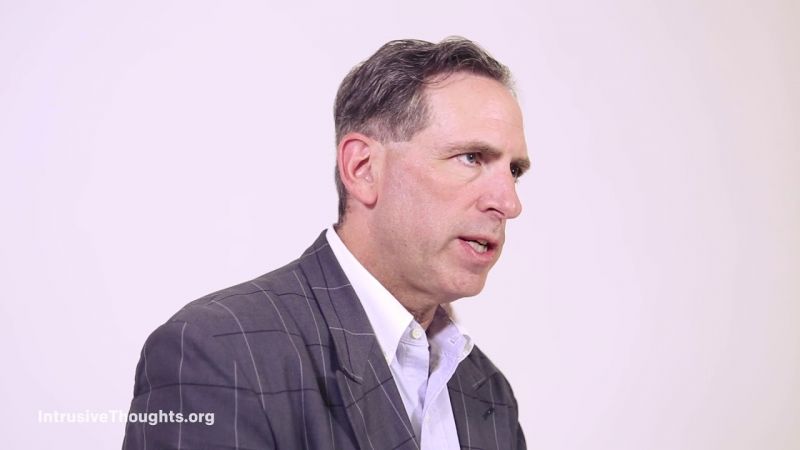Talking OCD Treatment with Dr. Steven Phillipson
How Should People Treat their Obsessive Compulsive Disorder?
Escrito por Lauren O'Shaughnessy
01 Dr. Steven Phillipson is a licensed clinical psychologist who has specialized in the Cognitive-Behavioral Treatment (CBT) of OCD since 1986.
02 In this video, he discusses recommended treatments for OCD. For more info on Dr. Phillipson, please visit: www.ocdonline.com
03 OCD3 is a web series that brings professional perspectives to the OCD community so sufferers can make healthy decisions and lead better lives.

OCD3: Treatment
Read the full transcript below:
1) What are the best ways to treat OCD?
The are two gold standard treatments for obsessive compulsive disorder. The first is aggressive Exposure and Response Prevention therapy (ERP). I differentiate ERP from another common type of therapy known as Cognitive Behavioral Therapy (CBT). I do so because CBT is a treatment that has patients dispute irrational thoughts, and there’s a lot of irrational thinking with OCD. The thoughts aren’t really the basis of the problem (they are part of it, but not all of it) so I don’t tend to perform CBT. I do more traditional behavior therapy which is very aggressive and very powerful. The other gold standard is utilizing medication. Often these two things are combined. Sometimes a patient will take one or the other.
2) Can mindfulness help treat OCD?
There are some auxiliary treatments that are thought of as potentially beneficial to the two primary treatments. One is something referred to as mindfulness, which is the mental discipline of becoming aware of how our brain works as a machine. Mindfulness is the ability to be aware of our in-the-moment surroundings. It keeps us attending to the present moment rather than worrying about the past or distressing about the future. And mindfulness allows us to see our brain's messages as a separate entity from our own identity and our own individuality. So in that regard, I think it's a very positive and powerful potential adjunct along with things like meditation and yoga.
3) Does being physically active help reduce OCD symptoms?
I think exercise is a wonderful panacea in the support of the treatment of OCD. Exercise is a tremendous antidepressant. It gives us a sense of accomplishment and agency. Agency means our faith in our ability to achieve goals based on the resources that we possess.
4) What is ACT: Acceptance and Commitment Therapy?
There’s a new wave in psychology called ACT, which stands for Acceptance and Commitment Therapy. Basically, this perspective supports the basic foundation of traditional behavioral psychology. ACT brings along the idea of making room for the distressing signals in our brain. When we don't fight anxiety, when we don't fight depression, when we live life through these experiences and go on with our life with an altered path, the brain tends to disengage from them as being paramount. By backing off of the experience as being the guiding force of controlling behavior, we can take back our lives and live with a lot more freedom.
5) Are there any experimental treatments?
Some extreme treatments involve something referred to as deep brain stimulation. Basically, deep brain stimulation is the implantation of electrodes deep into our brain stem. They found a pleasure center in our brain, and discovered that when we experience pleasure, a certain part of our brain is activated. With deep brain stimulation, they take electrodes and put an electrical impulse into that part of the brain to create a feel good experience. Feeling good and feeling anxious are contradictory and have a hard time coexisting. So the idea of pumping this electrical impulse into the feel good portion of the brain physiologically reduces a person's sense of distress, and therefore, reduces a person's desire to engage in ritualizing.
Another subset of treatment that's pretty radical is what's called a single-ectomy. This involves looking for the anxiety center of the brain and separating that from the rest of the brain's functioning. Doctors do so in what they hope is a safe way that doesn't modify a person's personality. Both deep brain stimulation and single-ectomies are still in their infancy.
The brain is a big black box that we have very very little solid knowledge about. Doctors are still poking around with these experimental and innovative treatments. At this point, I can say that I have not recommended any of my patients to these treatments because I find them to be unpredictable in their outcomes. Doctors have yet to show tremendous data results that are reliable and predictably favorable.
For more videos from our OCD3 series, head to our YouTube channel here.
Sobre el autor
Lauren is the editorial director and cofounder at the Made of Millions Foundation. She has been a part of the team since its launch in 2016. She has been open about her personal struggles with Generalized Anxiety Disorder and social phobia. You can follow her on Instagram at www.instagram.com/internet_lauren.
Apoya nuestro trabajo
Nuestra misión es cambiar la manera en que el mundo percibe la salud mental.



















